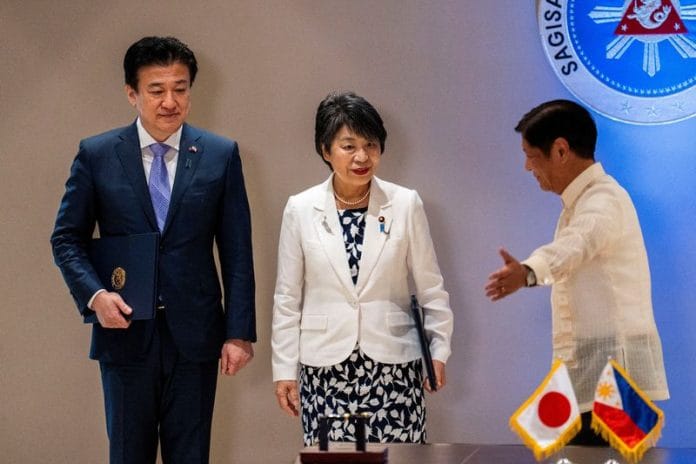By Mikhail Flores and Karen Lema
MANILA (Reuters) – The Philippines and Japan boosted their defence ties by signing a reciprocal access agreement (RAA) on Monday, saying they were seeking stability in the region, amid rising tensions with China.
Japanese Foreign Minister Yoko Kamikawa described the pact, which eases the entry of equipment and troops for combat training and disaster response, as a “landmark achievement”.
The deal is the first of its kind to be signed by Japan in Asia and coincides with a rise in assertive actions Chinese vessels in the disputed South China Sea.
“This is another milestone in our shared endeavour to ensure a rules-based international order,” Philippine Defence Minister Gilberto Teodoro told reporters after the signing.
Both the Philippines and Japan, two of the United States’ closest Asian allies, have taken a strong line against what they see as an increasingly assertive China in the South China Sea, a region where Beijing’s expansive claims conflict with those of several Southeast Asian nations.
An international tribunal in 2016 said China’s claims had no legal basis, a ruling that Beijing rejects.
Japan, which last year announced its biggest military build-up since World War Two in a step away from its post-war pacifism, does not have any claims to the South China Sea, but has a separate maritime dispute with China in the East China Sea, where the two countries have repeatedly faced off.
It has supported the Philippines’ position in the South China Sea and has expressed concern over China’s actions, including recent incidents that resulted in damage to Philippine vessels and injured a Filipino sailor.
“The Philippines and other Southeast Asian Nations are situated in … a key junction of Japan’s sea lanes; advancing defence cooperation and exchanges with the Philippines is important for Japan,” Defence minister Minoru Kihara added.
Lin Jian, a spokesperson for the Chinese foreign ministry, said the Asia-Pacific region does not need military blocs, still less does it need to provoke confrontation between different camps or small circles that encourage a new Cold War.
“During World War II, Japan was responsible for invasion and colonial rule of Southeast Asian countries, including the Philippines,” Lin told reporters in answer to a question at a regular briefing. “Japan should seriously reflect on its history of aggression and be cautious in words and deeds in the field of military security.”
The Philippines has a Visiting Forces Agreement with the United States and Australia. Tokyo, which hosts the biggest concentration of U.S. forces abroad, has similar RAA deals with Australia and Britain, and is negotiating another with France.
The RAA will take effect after being ratified by both countries’ parliaments.
(Reporting by Mikhail Flores and Karen Lema; Additional reporting by Liz Lee in Beijing; Editing by Miral Fahmy and David Holmes)
Disclaimer: This report is auto generated from the Reuters news service. ThePrint holds no responsibilty for its content.






